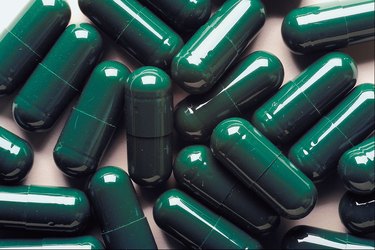
Lysine is an essential amino acid, meaning the human body cannot produce it, but the body requires it to function properly. Lysine is most commonly found in beef, fish, chicken and soy, but it can also be found in beans and dairy products. The average adult requires about .85 g of lysine a day. Individuals who exercise may benefit from taking as much as 1 g to 3 g of lysine daily.
Muscle Synthesis
Video of the Day
Lysine is found in abundance in skeletal muscle. It plays an important role in the building and maintenance of skeletal muscle tissue. Low levels of lysine have been linked to a slowdown of protein synthesis. Protein synthesis is essential in helping your body rebuild muscle after a workout. When you exercise your muscles, the muscle proteins break down. Lysine helps to rebuild muscle tissue, aiding in the recovery process after a workout.
Video of the Day
Lysine And Vitamin C
Lysine, like most amino acids, don't act alone. Often, amino acids will combine with vitamins, minerals, and other compounds in your body to form other amino acids. Lysine readily combines with vitamin C, especially when concentrations of lysine in the body are high. When lysine is combined with vitamin C, your body will convert it into another amino acid, carnitine. Carnitine helps the body metabolize fat stores and regulate oxygen. When you exercise, this means that your body will be more efficient in burning fat and delivering oxygen to muscles that need it.
Lysine And Arginine
Just like lysine's ability to combine with vitamins, its effects can also be enhanced when it is taken along with other amino acids. Arginine is a conditionally nonessential amino acid, meaning most of the time your body will produce enough, so that dietary sources are not needed. Evidence suggests that when lysine and arginine are found together, plasma levels of human growth hormone increase. An increase in the presence of human growth hormone helps athletes build muscle and enhance athletic performance.
Anti-Catabolic Effect
Catabolism is the process of breaking down tissues. When you exercise, your body enters a catabolic state. After exercise, it is important to reverse this catabolic effect and enter an anabolic state, which is a state of tissue growth. Lysine has been found to decrease the rate of protein degradation in the body, thus acting as a anti-catabilic compound. By slowing the rate of protein degradation, it is easier for your body to become anabolic after a workout and to recover and build muscle.